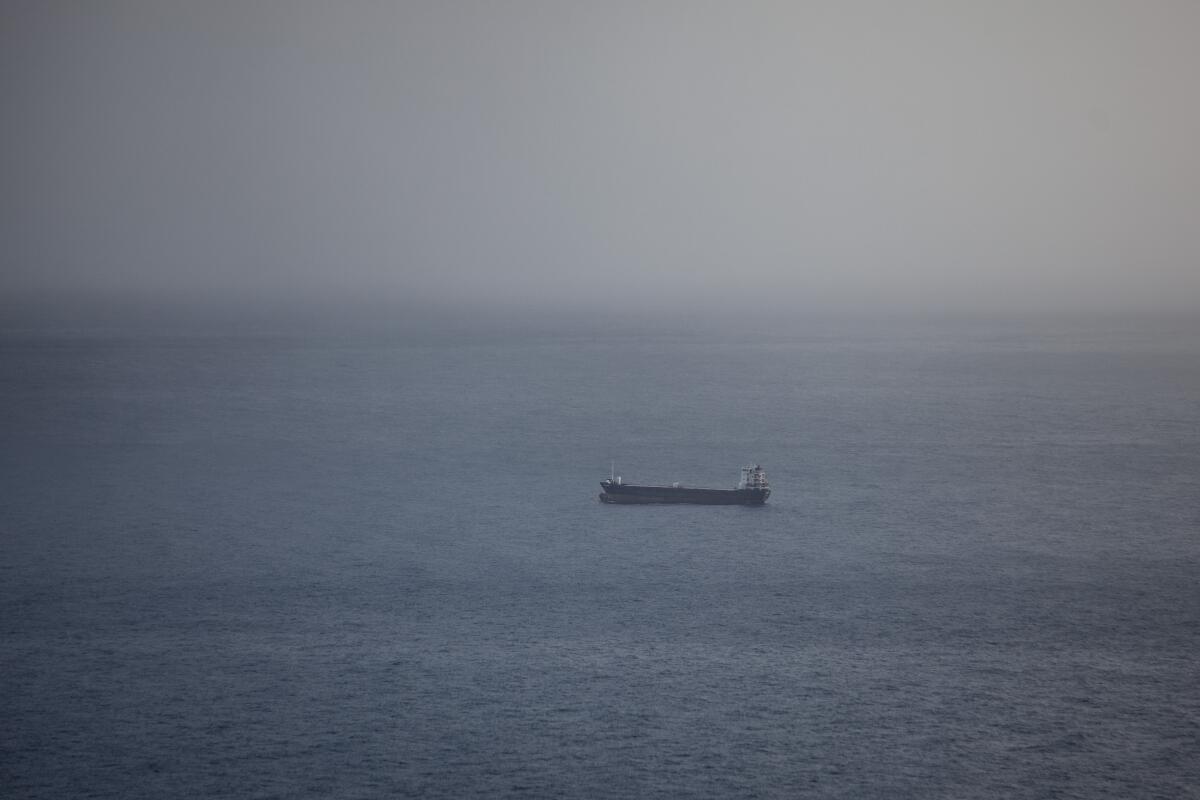2 attacks by Yemen’s Houthi rebels strike container ships in vital Red Sea corridor

DUBAI — A ballistic missile fired by Yemen’s Houthi rebels slammed into a cargo ship Friday in the Red Sea near the strategic Bab el-Mandeb Strait, after another attack only hours earlier that struck a separate vessel, authorities said.
The missile attack on the MSC Palatium III and the earlier assault on the Al Jasrah escalate a maritime campaign by the Iranian-backed Houthis. The attacks also endanger ships traveling through a vital corridor for cargo and energy shipments for Europe and Asia from the Suez Canal out to the Indian Ocean.
The Houthis say their attacks aim to end the pounding Israeli air-and-ground offensive targeting the Gaza Strip amid that country’s war on Hamas. However, the links to the ships targeted in the rebel assaults have grown more tenuous as the attacks continue.
“The Yemeni armed forces confirm they will continue to prevent all ships heading to Israeli ports from navigating in the [Red Sea] until they bring in the food and medicine that our steadfast brothers in the Gaza Strip need,” the Houthi military spokesman, Brig. Gen. Yahya Saree, said in a statement claiming responsibility for Friday’s attacks.
Advocates say the separations stem from the federal government’s ongoing practice of releasing high volumes of migrants to street locations around San Diego County without coordinated reception plans.
The recent attacks led Maersk, the world’s biggest shipping company, to announce Friday that it’s told all of its vessels planning to pass through the Bab el-Mandeb Strait to “pause their journey until further notice.” German-based shipper Hapag-Lloyd, which was operating the Al Jasrah, also said it was pausing all its container ship traffic through the Red Sea until Monday.
Meanwhile, hijackers, probably from Somalia, separately seized a Bulgarian ship in the Arabian Sea.
A U.S. Defense official and the private intelligence firm Ambrey said the MSC Palatium III, a Liberian-flagged container ship, caught fire after the strike. It wasn’t immediately clear whether anyone on board the vessel had been hurt.
Two missiles were fired in the attack, probably trying to hit the Al Jasrah, the U.S. official said. One went wide and splashed down in the water, the other slammed into the Palatium, the official said.
The Palatium turned around after the attack and was trying to head south, tracking data analyzed by the Associated Press showed.
The Houthis earlier warned the MSC Alanya, another vessel belonging to Switzerland-based MSC, or Mediterranean Shipping Co., around the Bab el-Mandeb, Ambrey said.
“The parent company had cooperated with Israel, and this was likely the reason why she was threatened,” said the U.S. official, who spoke on condition of anonymity to discuss intelligence matters. MSC did not immediately respond to a request for comment.
In the earlier Al Jasrah attack, it remained unclear if it was a missile or drone that hit the vessel, the official said. Ambrey and the British military’s United Kingdom Maritime Trade Operations, which monitors Mideast shipping lanes, also confirmed that attack.
“The projectile reportedly hit the port side of the vessel and one container fell overboard due to the impact,” Ambrey said. “The projectile caused a ‘fire on deck’ which was broadcast via” radio.
Shipper Hapag-Lloyd said no crew member had been hurt in the attack. It later announced that it was also pausing its ships through the Red Sea until Monday and “will decide for the period thereafter.”
Ambrey noted that Hapag-Lloyd “is known to have offices in the Israeli ports of Ashdod, Haifa and Tel Aviv.”
In his statement, military spokesman Saree claimed the Houthis targeted the Palatium III and the Alanya — not the Al Jasrah. It wasn’t immediately clear why he erroneously identified the second ship.
Global shipping has increasingly been targeted as the Israel-Hamas war threatens to become a wider regional conflict — even during a brief pause in fighting during which Hamas exchanged hostages for Palestinian prisoners held by Israel. The collapse of the truce has raised the risk of more sea attacks.
The Bab el-Mandeb Strait is only 18 miles wide at its narrowest point, limiting traffic to two channels for inbound and outbound shipments, according to the U.S. Energy Information Administration. Nearly 10% of all oil traded at sea passes through it. An estimated $1 trillion in goods pass through the strait annually.
In November, Houthis seized a vehicle transport ship linked to Israel in the Red Sea off Yemen. The rebels still hold the vessel near the port city of Hodeida. Separately, a container ship owned by an Israeli billionaire came under attack by a suspected Iranian drone in the Indian Ocean.
A separate, tentative cease-fire between the Houthis and a Saudi-led coalition fighting on behalf of Yemen’s exiled government has held for months despite that country’s long war. That’s raised concerns that any wider conflict in the sea — or a potential reprisal strike from Western forces — could reignite those tensions in the Arab world’s poorest nation.
Also Thursday, unknown attackers boarded the Malta-flagged bulk carrier Ruen, managed by Navigation Maritime Bulgare, in the Arabian Sea off the Yemeni island of Socotra, Ambrey and the United Kingdom Maritime Trade Operations said. Bulgarian authorities said the ship’s 18-member crew hailed from Angola, Bulgaria and Myanmar.
“The necessary steps have been taken to pass the information on to all foreign partners and institutions that we will count on to provide assistance,” Bulgarian Foreign Minister Maria Gabriel told reporters Friday.
No group immediately claimed responsibility for the assault. However, suspicion immediately fell on pirates from Somalia. Somali piracy had dropped in recent years, but there has been growing concern it could resume amid the wider chaos of the Houthi attacks and the political uncertainty gripping the East African nation.
On Friday, the United Kingdom Maritime Trade Operations issued a warning to shippers saying that the security manager for the Ruen “believes the crew no longer has control of the vessel” and that it is heading toward Somalia. The European Union’s anti-piracy force in the region said the Spanish frigate Victoria was on its way to intercept the “alleged pirate-hijacked vessel.”
More to Read
Sign up for Essential California
The most important California stories and recommendations in your inbox every morning.
You may occasionally receive promotional content from the Los Angeles Times.











